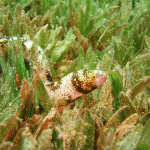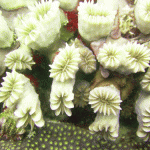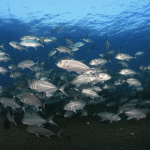
Light and temperature trigger the loss of symbiotic algae (bleaching) in a nutrient-stressed staghorn coral. Image: University of Southampton
Improving water quality could help save coral reefs.
Coral polyps and their associated zooxanthellae depend on each other for survival- the coral provides shelter and nutrients, while the single-celled algae provide the corals with an energy source through photosynthesis. However, high temperatures can threaten this relationship by blocking photosynthetic reactions in the algal cells. This causes a build-up of toxic oxygen compounds, resulting in the expulsion of the algae from their calcareous home and bleaching of the polyps.
Bleaching usually leads to coral death, which has already had devastating effects on coral reef ecosystems. Now scientists from the University of Southampton and the National Oceanography Centre, Southampton, in the UK have found that nutrient imbalances in the water can increase the corals’ susceptibility to heat-induced bleaching.
The growth rate of the zooxanthellae is restricted by the limited supply of nutrients, allowing them to transfer a large amount of their photosynthetically fixed carbon to the coral. This growth becomes unbalanced when the availability of a specific nutrient decreases compared to the algae’s demand, causing starvation. For example a decrease in phosphate, when combined with increased nitrogen, results in phosphorous starvation.
This condition is associated with a reduction in photosynthetic efficiency and increases the susceptibility of corals to temperature- and light-induced bleaching. “The findings suggest that a balanced reduction of the nutrient input in coastal waters could help to mitigate the effects of increasing seawater temperatures on coral reefs,” says Dr Jörg Wiedenmann, who led the study published in Nature.
Source: Eurekalert






